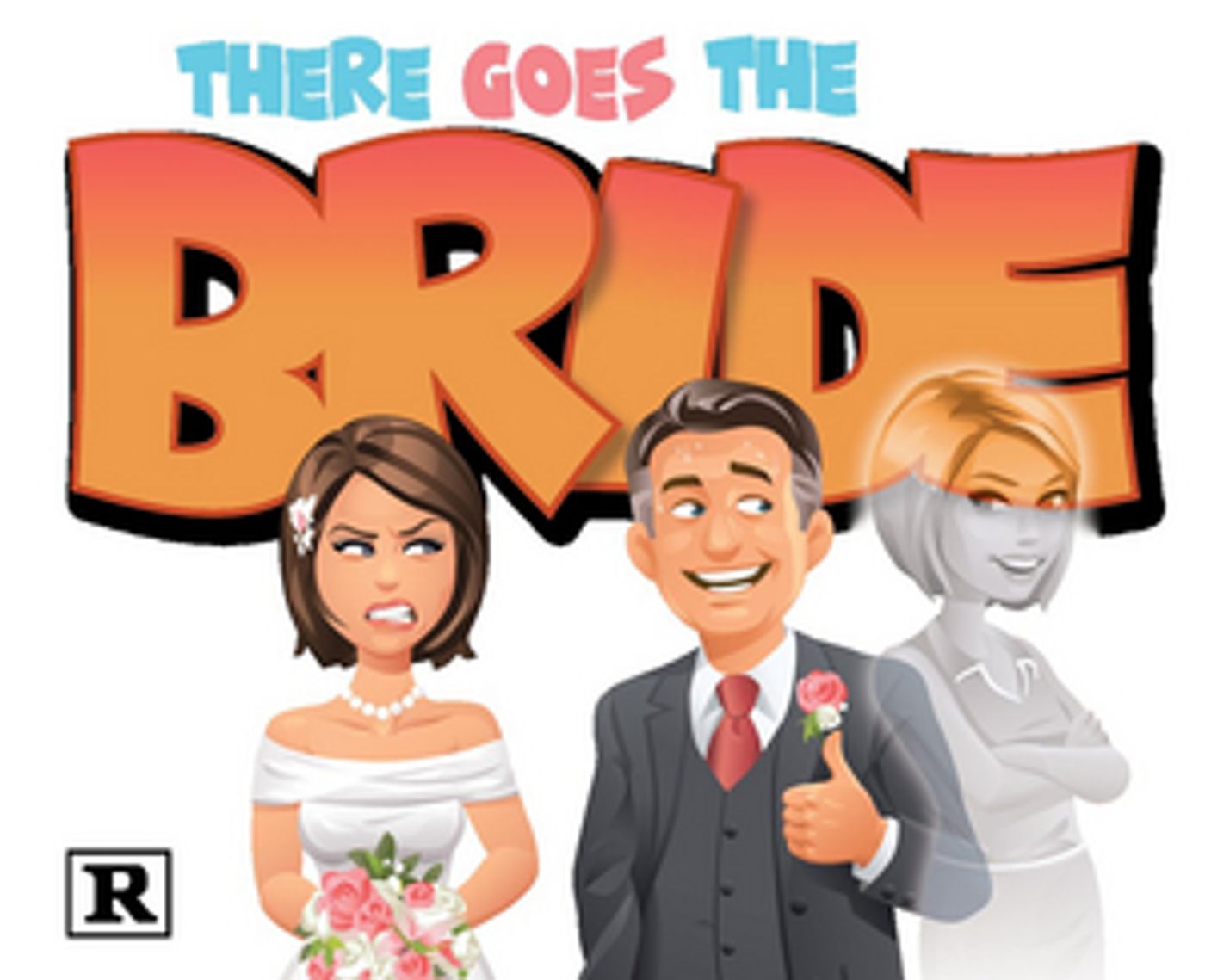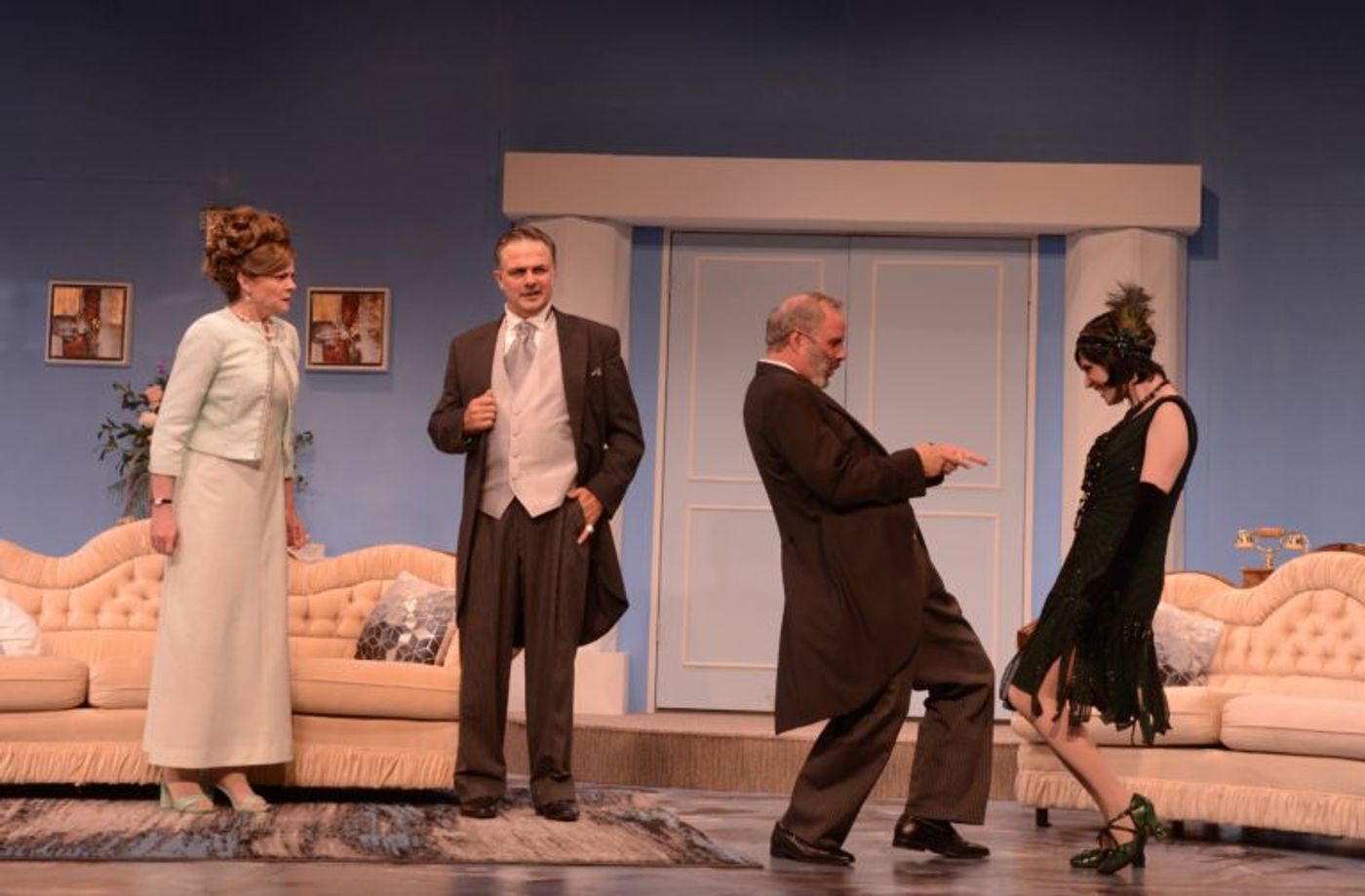Review: THERE GOES THE BRIDE at Stage West Theatre Restaurant

Stage West Theatre Restaurant started their season off with a British-centered comedy with some moments that fell flat and others where actors fell flat on their face.
There Goes the Bride tells the story of Timothy Westerby; Tim is stressed about work, about his home life, and about his daughter's wedding which is set to start in less than an hour. But a bump on the head summons forth a creature from his mind named Polly who causes chaos amongst the family. As they struggle to deal with his faltering sanity and keeping the bride from locking herself in her room and calling the whole thing off, the kooky cast of characters also try to keep the groom's family at bay, and pray that Polly doesn't cause any more problems.
Written by Ray Cooney and John Chapman, I had no idea what to expect when I walked into the theatre. How farcical would it be? How heartwarming? How overdramatic? It turned out to be a concoction of throw-away lines, physical gags, and high energy movement that kept me entertained, if a bit distracted.
In terms of plot, I was very intrigued by the concept but the execution was a little scattered. There were some clever moments and there was genuine laughter, but there were lines that I expected to have a bigger payoff. The whole pace of the show felt that way. I was waiting for something bigger to happen. I was waiting for her to show up in lilac, I was waiting for him to pinch her bottom. But nothing ever came of it.
Director Liz Gilroy, however, created a well-structured comedy. I saw the attention to detail in the set ups and the intention of the gags. I don't mind when a show has predictable moments. There something's fun in the anticipation and having knowledge that characters don't. What I enjoy is the execution of the moments that I know are coming, and I think Gilroy did an excellent job.
With a Set Design by Sean D. Elli, Costume and Wig Design by Norman J. Galenza-MacDonald, Lighting Design by Ajay Badoni, and Sound Design by Michael Gesy, everything was set up to be a classic Stage West production; featuring good actors, a good design, and a promise of a good night out that delivers for the most part.
Mark Weatherly played Timothy Westerby's descent into madness as though he, himself, had been seeing Polly all his life. His different personalities were distinct and energetic and his physical moments were very well timed. I loved watching him dance around the stage and couldn't wait to see what he did next. His wife, Ursula, was an absolute hoot. Susie Burnett played an excellent frantic mother and wife trying to keep everyone on schedule. She had wonderful posture and carried herself well.

As for the figment herself, none other than Sarah English took to the stage as Polly, the girl of Timothy's dreams. English was positively charming and wild as the 1920s gal with a flair for kissing married men, and I wish she had more of an opportunity to show off her dazzling talent. She was always ushered out of the room before we really got to see what mischief she could make.
Timothy's business partner and oldest friend Bill Shorter, played by Roger Shank, was another interesting character. Though quite a bit taller than his scene partner, I enjoyed Shank's performance. I have no complaints about his characterization except that he came off as quite amicable and sane which, given the character's description, seemed a little strange. He was, however, a wonderful companion to Burnett's Ursula as the pair of level headed wranglers of the various insane plots (something I desperately needed when I thought I would go crazy myself).
Ursula's parents Dr. Gerald Drimmond (played by David Talbot) and Daphne Drimmond (played by Maria Tratt), only served to add chaos and I loved it. Talbot was absolutely one of my favourite performances. He had a wonderful physicality as the frail old grandfather, and I was always excited when he entered, wondering what he could possibly say next. Daphne Drimmond seemed to be a caricature of an old English aristocrat (the kind you see in Children's films). If that was intention, then Tratt played her to a T. Otherwise, the rest of the cast needed to match her exaggerated expressions and take it all out of the realm of realism.
Rounding out the cast of characters was the bride herself, Judy Westerby (played by Jenny Weisz), and the father of the groom Charles Babcock (played by Scott Maudsley). I expected Judy to have more of a part of play in her own wedding but she spent a lot of the time storming off in tears (not that I blame her) and we rarely saw her. I enjoyed the recurring gag, however, and smiled every time she started to whimper. Though we see very little of him by comparison, Maudsley is a very imposing figure and drew the attention throughout his few scenes. I do feel that his descent into madness was a bit surprising. I didn't feel or see the build up and so when the groom's father finally cracked, it came out of nowhere.
Though I enjoyed the cast of characters and their wacky hijinks, I feel there was a disconnect between the words they were saying and the characters they were playing. I don't know where the disconnect occurred but it didn't entirely detract from a fun evening out.
There Goes the Bride will be playing at Stage West Theatre Restaurant until Nov 10 and tickets can be purchased at www.stagewestcalgary.com
Reader Reviews
Videos

